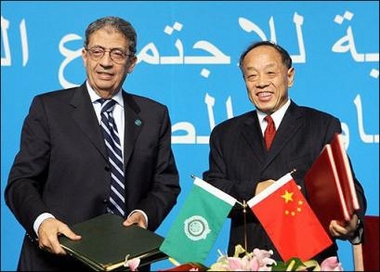China and the Arab League nations yesterday agreed to work together on energy
and counter-terrorism measures as part of their drive to build a new
partnership.

Arab League Secretary General Amr
Moussa (L) and Chinese Foreign Minister Li Zhaoxing (R) pose with the
China-Arab Cooperation Forum's plan for 2006-2008 in Beijing.
[AFP] |
Both sides place heavy emphasis on energy co-operation particularly over oil,
natural gas and renewable power according to an action plan issued in the wake
of the second ministerial meeting of the China-Arab Co-operation Forum, which
concluded in Beijing yesterday.
"China and the Arab countries will encourage their enterprises to increase
mutual investment and set up joint ventures in the energy sector," said the
document which was signed by Foreign Minister Li Zhaoxing and Arab League
Secretary-general Amre Moussa.
The first oil meeting between China and the Arab countries will be held some
time between 2006 and 2008, according to the plan.
The Arab countries are China's largest crude oil supplier. Last year 55.36
million tons of crude were imported from Arab countries, 43.7 per cent of the
nation's total oil imports.
In a communiqu signed yesterday, the two sides also agreed to step up
anti-terror co-operation in bilateral, regional and multi-lateral fields.
During the two-day conference, foreign ministers and representatives of the
22 Arab states discussed political and economic collaboration with China.
The meeting made it clear that "building a new partnership" is the direction
of future China-Arab relations, Li said at a joint news conference with Moussa
and Mohammad Hussain Al Sha'ali, current president of the Council of the Arab
League.
"Looking back, we can summarize the 50 years of Sino-Arab relations as mutual
trust, mutual benefit and mutual assistance," Li said.
Echoing Li, Sha'ali said co-operation with China is conducive to development
in Arab countries and the stability and prosperity of the whole region.
A plan on environmental co-operation and a memorandum of understanding for a
meeting between Chinese and Arab entrepreneurs were also signed.
Responding to a question about the conflict between Palestinians and
Israelis, Moussa urged Hamas to recognize the Arab peace initiative and said the
conflict should be resolved through political negotiations.
On Wednesday, Palestinian Foreign Minister Mahmud al-Zahar told the forum
that the Palestinian Government would study the Arab peace initiative with a
"serious and positive attitude," in an attempt to find a just solution to the
conflict.
"Zahar's remarks are a positive sign and China welcomes them," Foreign
Ministry spokesman Liu Jianchao said at a regular news conference in Beijing
yesterday.
"China insists on the settling of the Middle East issue through negotiation
on the basis of the relevant United Nations resolutions and the principle of
land for peace," Liu said.
"We hope the international community will make concerted efforts to encourage
the new Palestinian government to adopt a more active attitude, to renounce
violence, accept the previously reached agreements and start peace talks with
Israel."
(China Daily 06/02/2006 page2)